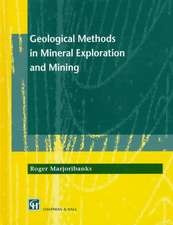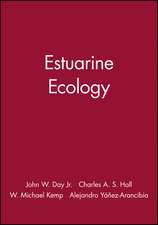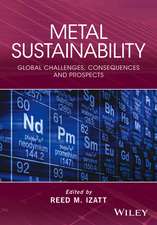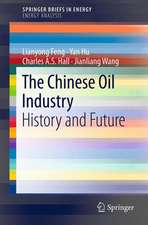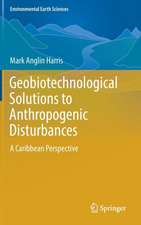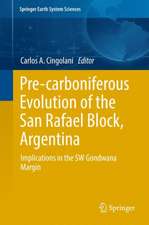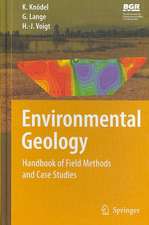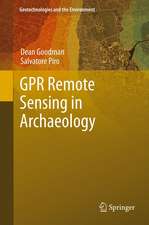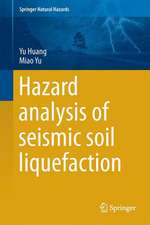The First Half of the Age of Oil: An Exploration of the Work of Colin Campbell and Jean Laherrère: SpringerBriefs in Energy
Autor Charles A. S. Hall, Carlos A. Ramírez-Pascuallien Limba Engleză Paperback – 5 dec 2012
- Covers a topic that eclipses climate change as the most important but least understood challenge for contemporary society
- Explores the works of Colin Campbell and Jean Laherrère, the leading authorities in the field of Peak Oil, authors of “The End of Cheap Oil” (Scientific American, 1998), and founding members of the Association for the Study of Peak Oil & Gas
- Addresses a broad audience of scientists, engineers, and economists in a format that is accessible to the general public
- Provides a complete overview of the basic geological, chemical, physical, economic and historical concepts that every oil consumer should understand
- Presents the latest information on oil production, reserves, discoveries, prices, and fields in easy-to-understand graphs and plots
Din seria SpringerBriefs in Energy
-
 Preț: 345.89 lei
Preț: 345.89 lei -
 Preț: 345.89 lei
Preț: 345.89 lei -
 Preț: 376.04 lei
Preț: 376.04 lei -
 Preț: 377.35 lei
Preț: 377.35 lei -
 Preț: 476.42 lei
Preț: 476.42 lei -
 Preț: 343.36 lei
Preț: 343.36 lei -
 Preț: 374.85 lei
Preț: 374.85 lei -
 Preț: 376.59 lei
Preț: 376.59 lei -
 Preț: 477.72 lei
Preț: 477.72 lei -
 Preț: 176.35 lei
Preț: 176.35 lei -
 Preț: 380.07 lei
Preț: 380.07 lei -
 Preț: 376.22 lei
Preț: 376.22 lei -
 Preț: 377.95 lei
Preț: 377.95 lei -
 Preț: 376.43 lei
Preț: 376.43 lei -
 Preț: 377.73 lei
Preț: 377.73 lei -
 Preț: 343.00 lei
Preț: 343.00 lei -
 Preț: 377.35 lei
Preț: 377.35 lei -
 Preț: 377.95 lei
Preț: 377.95 lei -
 Preț: 444.35 lei
Preț: 444.35 lei -
 Preț: 348.83 lei
Preț: 348.83 lei -
 Preț: 412.30 lei
Preț: 412.30 lei -
 Preț: 377.73 lei
Preț: 377.73 lei -
 Preț: 375.62 lei
Preț: 375.62 lei -
 Preț: 376.80 lei
Preț: 376.80 lei -
 Preț: 376.22 lei
Preț: 376.22 lei -
 Preț: 479.67 lei
Preț: 479.67 lei - 15%
 Preț: 463.85 lei
Preț: 463.85 lei -
 Preț: 476.79 lei
Preț: 476.79 lei -
 Preț: 375.23 lei
Preț: 375.23 lei -
 Preț: 379.09 lei
Preț: 379.09 lei -
 Preț: 376.22 lei
Preț: 376.22 lei -
 Preț: 409.43 lei
Preț: 409.43 lei - 15%
 Preț: 462.38 lei
Preț: 462.38 lei -
 Preț: 414.21 lei
Preț: 414.21 lei -
 Preț: 375.62 lei
Preț: 375.62 lei -
 Preț: 374.30 lei
Preț: 374.30 lei -
 Preț: 376.22 lei
Preț: 376.22 lei - 15%
 Preț: 463.35 lei
Preț: 463.35 lei -
 Preț: 381.71 lei
Preț: 381.71 lei -
 Preț: 379.09 lei
Preț: 379.09 lei -
 Preț: 375.62 lei
Preț: 375.62 lei - 15%
 Preț: 463.35 lei
Preț: 463.35 lei -
 Preț: 376.80 lei
Preț: 376.80 lei -
 Preț: 374.46 lei
Preț: 374.46 lei -
 Preț: 477.56 lei
Preț: 477.56 lei -
 Preț: 379.48 lei
Preț: 379.48 lei -
 Preț: 374.30 lei
Preț: 374.30 lei -
 Preț: 479.47 lei
Preț: 479.47 lei -
 Preț: 378.12 lei
Preț: 378.12 lei
Preț: 380.07 lei
Nou
Puncte Express: 570
Preț estimativ în valută:
72.72€ • 75.93$ • 60.19£
72.72€ • 75.93$ • 60.19£
Carte tipărită la comandă
Livrare economică 04-18 aprilie
Preluare comenzi: 021 569.72.76
Specificații
ISBN-13: 9781461460633
ISBN-10: 1461460638
Pagini: 144
Ilustrații: XV, 127 p. 30 illus., 25 illus. in color.
Dimensiuni: 155 x 235 x 17 mm
Greutate: 0.23 kg
Ediția:2013
Editura: Springer
Colecția Springer
Seriile SpringerBriefs in Energy, Energy Analysis
Locul publicării:New York, NY, United States
ISBN-10: 1461460638
Pagini: 144
Ilustrații: XV, 127 p. 30 illus., 25 illus. in color.
Dimensiuni: 155 x 235 x 17 mm
Greutate: 0.23 kg
Ediția:2013
Editura: Springer
Colecția Springer
Seriile SpringerBriefs in Energy, Energy Analysis
Locul publicării:New York, NY, United States
Public țintă
ResearchCuprins
Preface.- Introduction.- Oil, Money and our Modern Civilization.- The Nature of Petroleum.- The Early Oil Industry.- King Hubbert: A Pioneer of a Different Kind.- The End of Cheap Oil.- What Do We Know About “Peak Oil” Today?.- The Formation of ASPO and the Growing Influence of the “Peak Oil” Community.- The Other Side.- Conclusions.- Index.
Notă biografică
Professor Charlie Hall is a systems ecologist with strong interests in energy flows in natural systems and human society. He received his PhD from Dr. Howard Odum at the University of North Carolina at Chapel Hill in 1970. His work has involved streams, estuaries and tropical forests, but has focused increasingly on human-dominated ecosystems in the US and Latin America. He is best known for developing the concept of EROI, or energy return on investment, as it relates to e.g. migrating fish and obtaining oil and gas. Hall’s latest focus has been on developing an alternative approach to economics called biophysical economics, an attempt to understand human economies from a biophysical rather than just social perspective. He recently co-authored “Energy and the Wealth of Nations: Understanding the Biophysical Economy” with economist Kent Klitgaard.
Carlos A. Ramírez-Pascualli is a Ph.D. student in environmental science at the State University of New York, College of Environmental Science and Forestry (SUNY-ESF), where he is doing research on the biophysical aspects of economic systems, specifically on the relation of oil production to the Mexican economy. He holds degrees from some of the leading institutions in Mexico and Latin America: M.Sc. Economics from El Colegio de México (COLMEX), and B. Sc. Industrial Engineering from Universidad Nacional Autónoma de México (UNAM). Before entering the Ph.D. program at SUNY-ESF, he was part of the team that developed the main information system at the Federal Competition Commission in Mexico. Previously, he worked as researcher and teaching assistant in several microeconomic courses at COLMEX. In addition to his official degrees, he has studied statistics and enjoys reading as much philosophy as he can.
Carlos A. Ramírez-Pascualli is a Ph.D. student in environmental science at the State University of New York, College of Environmental Science and Forestry (SUNY-ESF), where he is doing research on the biophysical aspects of economic systems, specifically on the relation of oil production to the Mexican economy. He holds degrees from some of the leading institutions in Mexico and Latin America: M.Sc. Economics from El Colegio de México (COLMEX), and B. Sc. Industrial Engineering from Universidad Nacional Autónoma de México (UNAM). Before entering the Ph.D. program at SUNY-ESF, he was part of the team that developed the main information system at the Federal Competition Commission in Mexico. Previously, he worked as researcher and teaching assistant in several microeconomic courses at COLMEX. In addition to his official degrees, he has studied statistics and enjoys reading as much philosophy as he can.
Caracteristici
Covers a topic that eclipses climate change as the most important but least understood challenge for contemporary society Explores the works of Colin Campbell and Jean Laherrère, the leading authorities in the field of Peak Oil, authors of “The End of Cheap Oil” (Scientific American, 1998), and founding members of the Association for the Study of Peak Oil & Gas Addresses a broad audience of scientists, engineers, and economists in a format that is accessible to the general public Provides a complete overview of the basic geological, chemical, physical, economic and historical concepts that every oil consumer should understand Presents the latest information on oil production, reserves, discoveries, prices, and fields in easy-to-understand graphs and plots


